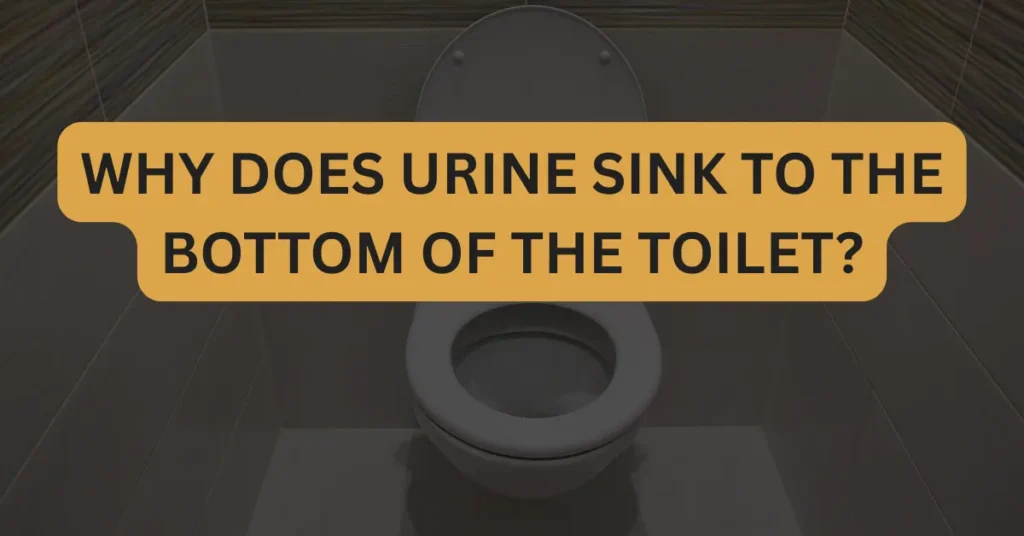You may have seen this before: when you go to the bathroom and pee, it goes right to the bottom of the toilet bowl. It’s a simple thing that most of us don’t think about, but once you see it, you can’t help but wonder why it does that.
The response isn’t strange or random. It’s based on basic science that we use every day, like why oil floats on soup or why a boulder sinks in a lake. Urine, like previous instances, has its own qualities that affect how it acts in water.
We’ll explain it in simple terms, step by step, in the next parts so that the “why” behind this common observation makes perfect sense.
The Science of Density
Imagine throwing a rock into a pond. It sinks because it is heavier than the water surrounding it for its size. That’s density in action—it’s just how much “stuff” there in a specific amount of space. When something is denser than the liquid it’s in, gravity pulls it down. It floats if it’s less dense, like wood or cooking oil.
The same goes with pee. It is largely water, but it also has stuff your body needs to get rid of, like urea, salt, potassium, chloride, and phosphates. These dissolved things are really small, but they make the liquid heavier when they are all together.
Urine is frequently denser than pure water because it has particles in it that are dissolved. That tiny bit of added weight is enough to make it sink as it goes into the toilet bowl.
The Importance of Staying Hydrated
This is where your daily behaviors come into play. How much water you consume has a huge effect on how thick your urine is.
Your body has enough water to flush through when you’re well-hydrated. The extra water makes the waste less concentrated, which makes the pee lighter in color and closer in density to the water in the toilet. It might swirl and mix a little before finally settling down because it isn’t as hefty.
When you’re dehydrated, on the other hand, your body keeps water and squeezes out waste in a smaller, more concentrated bundle. That’s why the pee is darker. It’s also thicker, which makes it sink faster and more clearly.
Doctors apply this idea in tests like urine specific gravity, which checks for concentration. You can tell how hydrated you are by the color and smell of your urine, even if you don’t have any scientific equipment.
Gravity at Work
The main rule is that heavier liquids sink and lighter ones float. A glass of salad dressing is a good example of this: the oil rises to the top, and the vinegar stays at the bottom. The difference is in density, and gravity makes sure everything stays where it is.
The same goes for urine. Gravity drags it straight down to the bottom when it’s heavier than the water in the toilet bowl. If it’s lighter, it floats for a while, mingling in before finally settling. Gravity is the unseen hand that runs the show, no matter what.
Changes and Exceptions
Not every time you go to the restroom is the same, of course. Urine might sometimes look like it’s floating in the water or spreading out before it sinks. That usually happens when it’s really light or thin, so it’s more like the water in the toilet, and it takes a while for gravity to win.
Other things can also matter. The temperature differential between your pee and the water in the toilet can affect how soon they combine. The design of the toilet bowl or the splash and turbulence when you pee can also change how the liquid spreads.
So, even though the theory of density and gravity is the same, how it seems in real life can change based on minor things that happen every day.
Why It Matters
Doctors really do pay attention to pee density, so this isn’t simply bathroom trivia. A test called urine specific gravity checks how concentrated your pee is. It can give you information about your hydration, kidney function, and perhaps some health problems.
You don’t require lab equipment to gain a general notion on a day-to-day basis. The color of your urine and how it moves in water can tell you a little something about your health. pee that is pale and light normally means you are well-hydrated, while pee that is dark and heavy usually means your body needs more fluids.
In short, the things that go down your toilet can tell you a little bit about what’s going on within your body.
Conclusion
Urine sinks because it is usually denser than the water in the toilet bowl. The things that your body flushes out of the water make it heavy enough for gravity to draw it down.
So the next time you see it go straight to the bottom, remember that your toilet bowl is teaching you chemistry without a lab coat.
FAQs About Why Does Urine Sink to the Bottom of the Toilet?
1. Does pee always go down the toilet?
Not always. It usually does because it is denser than water. But if your pee is really thin (like after drinking a lot of water), it might mix more or even float for a short time before settling.
2. Why does urine that is darker sink faster than urine that is lighter?
Dark urine is more concentrated with waste particles like salts and urea. Because it has more concentration, it is denser, which causes gravity pull it down faster.
3. Can urine that doesn’t sink be a health problem?
Not usually. If your pee is pale and light, it usually suggests you have enough water. But if you observe weird changes that keep happening, such frothy urine, a very black hue, or a strange smell, you should see a doctor.
4. What is urine specific gravity?
It’s a medical test that measures how concentrated your urine is compared to pure water. They use it to assess how hydrated you are, how well your kidneys are working, and how healthy you are overall.
5. Does the toilet design or water temperature make a difference?
Yes. The way a toilet is shaped, how the water sits in the bowl, and even the temperature difference between urine and water can affect how quickly or slowly it sinks or disperses.
6. Why is urine mostly water if it sinks?
Yes, urine is mostly water, about 95%. But the small amount of solids that are dissolved in it makes it heavy enough to tip the scale and sink in water.
7. Is there any health benefit to watching how urine behaves in the toilet?
You don’t need to overanalyze it, but yes — the color and density of your urine can be a quick signal about hydration. Think of it as one of your body’s simplest feedback systems.
Read Also: Can You Die from Acid Reflux in Your Sleep?


